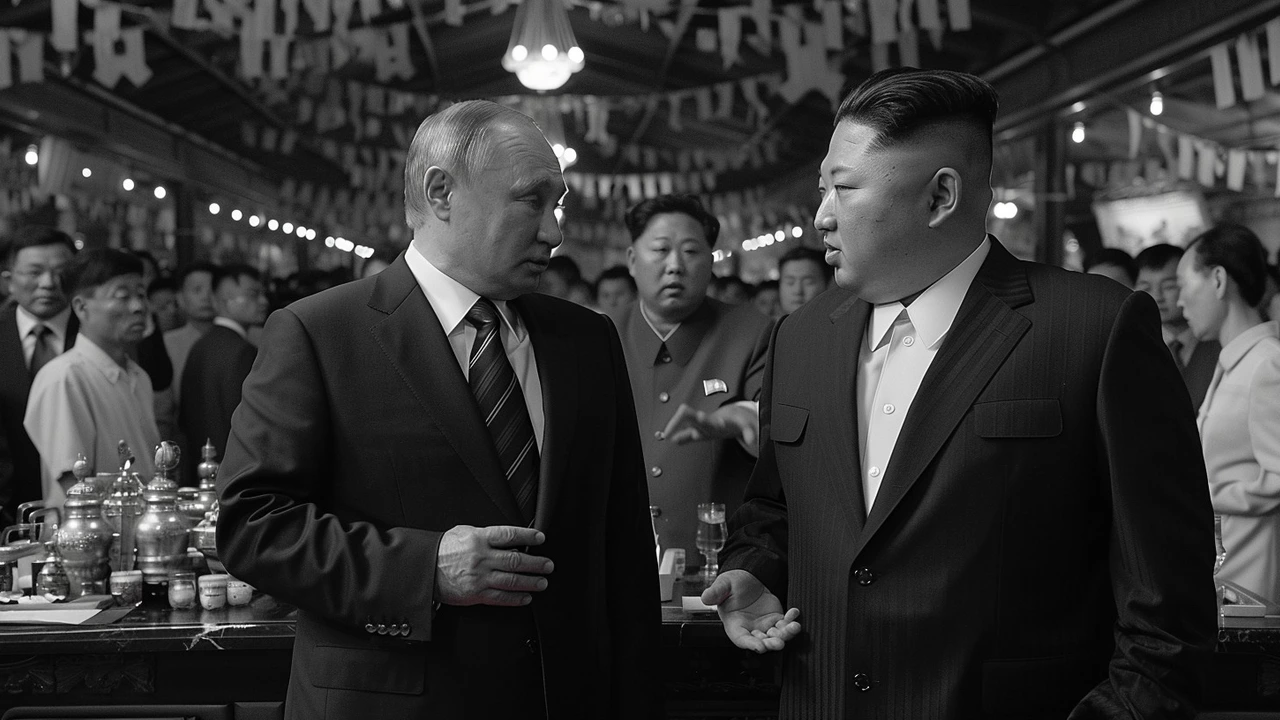The 'Lonely Bromance' Between Vladimir Putin and Kim Jong-un: A Complex Geopolitical Tale
Vladimir Putin, the enigmatic leader of Russia, has found an unusual ally in Kim Jong-un, the Supreme Leader of North Korea. Dubbed a 'lonely bromance' by Ukrainian Foreign Minister Dmytro Kuleba, this burgeoning alliance is more than a simple diplomatic relationship. It encapsulates a profound strategic partnership that raises numerous questions and concerns in the halls of Western diplomacy. This in-depth exploration delves into the intricacies of this bond and its broader implications on global security and regional dynamics.
Strategic Partnership and Defense Cooperation
The cornerstone of this budding relationship is a 'comprehensive strategic partnership' which intriguingly includes a mutual defense clause. While Kim Jong-un asserts that this alliance is 'strictly peace-loving and defensive', many find it difficult to overlook the increasing tangible military support North Korea provides to Russia. Reports indicate that North Korea is already shipping crucial supplies of shells and missiles to Russia, potentially aiding its ongoing conflicts. For Western diplomats and intelligence agencies, this is a development that cannot be ignored.
The concern stretches beyond the immediate military supplies. There is a looming fear of North Korean troops potentially participating in combat operations in Ukraine. Although such scenarios remain speculative, they echo the broader anxieties surrounding the implications of this alliance. Furthermore, the possibility of Russian assistance with North Korea's nuclear weapons program stirs unease across global security forums. These developments underscore the depth and seriousness of the 'lonely bromance' that threatens to impact international peace and stability profoundly.
Technological Collaboration and Euphemisms
Among the many facets of the Putin-Kim relationship is the intriguing discussion on 'space' technology. Diplomats and analysts suspect that 'space' may serve as a euphemism for advancing intercontinental ballistic missile (ICBM) capabilities. If these suspicions hold, this technological collaboration could have far-reaching ramifications. The deployment of advanced ICBMs by North Korea, enhanced by Russian technological prowess, would significantly alter the balance of power and escalate tensions in East Asia and beyond.
South Korea, a key regional player, has not remained silent in this arena. It has issued stern warnings to Putin, cautioning him against deepening the military ties with Kim further. Such warnings reflect the broader apprehensions in South Korea and other neighboring countries about the potential shift in military dynamics and the exacerbation of regional conflicts. The intricate dance between technological advancements and strategic partnerships thus remains a critical focus of attention and concern.
Economic and Geopolitical Ramifications: The Tumen River Agreement
In an interesting twist to the Russia-North Korea alliance, there are evolving plans to open the Tumen River, marking the border between these two nations, to Chinese shipping. Historically, Russia has resisted China's requests to open this river stretch, which has not served as a Chinese outlet to the Sea of Japan since the 1860s. However, recent developments indicate that Putin's mounting dependence on President Xi Jinping of China may lead to a significant policy change.
Should this agreement come to fruition, China's newfound access to the Sea of Japan would have substantial security implications. Japan, a significant regional power, would closely scrutinize this development, as it potentially threatens its maritime security and economic interests. Moreover, the overall balance of power in East Asia could shift, intensifying strategic rivalries and altering long-standing geopolitical dynamics.
This economic dimension adds another layer of complexity to the 'lonely bromance' between Putin and Kim Jong-un. It underscores how intertwined economic interests, security concerns, and strategic partnerships influence global affairs in intricate and often unpredictable ways. Consequently, the implications of the Tumen River agreement would ripple far beyond the immediate regional context, impacting global trade routes, security alignments, and diplomatic relationships.
Conclusion: A Global Chess Game
The strategic partnership between Vladimir Putin and Kim Jong-un encapsulates a sophisticated geopolitical maneuver that has profound ramifications. As Western diplomats and intelligence agencies diligently analyze this 'comprehensive strategic partnership', the world watches closely. The 'lonely bromance', characterized by its intricate defense cooperation, technological collaboration, and economic agreements, unfolds as a global chess game with high stakes.
In this elaborate game, each move by Putin and Kim has the potential to trigger a cascade of reactions across the globe. The mutual defense clause, the military supplies, potential combat support, nuclear and missile technology collaborations, and the Tumen River's opening are all critical elements that shape the evolving narrative. Each of these factors collectively underscores the importance of vigilant diplomacy, strategic foresight, and nuanced understanding in navigating the complex terrain of international relations.
Ultimately, the world stands at a crossroads, observing the 'lonely bromance' with a mix of curiosity, concern, and cautious anticipation. As this partnership unfolds, the broader implications for regional stability and global security remain a pivotal area of focus. The intricate dance between hommoeconomic interests, security concerns, and strategic alliances highlights the dynamic and ever-evolving nature of global politics in the 21st century.
